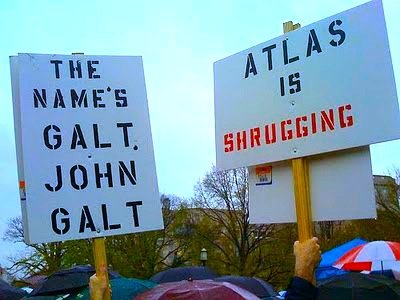
Vice-presidential candidate Paul Ryan has reportedly had favorable things to say about Ayn Rand, author of Atlas Shrugged and the philosophy of Objectivism, which stresses the absolutism of reason, reality and individual rights (including laissez-faire capitalism).
The New Yorker magazine reports the following on 8/11/12:
Rand’s works were an early and important influence on him, shaping his thinking as far back as high school. Later, as a Congressman, Ryan not only tried to get all of the interns in his congressional office to read Rand’s writing, he also gave copies of her novel ‘Atlas Shrugged’ to his staff as Christmas presents, as he told the Weekly Standard in 2003.
Two years later, in 2005, Ryan paid fealty to Rand in a speech he gave to the Atlas Society, the Washington-based think tank devoted to keeping Rand’s ‘objectivist’ philosophy alive. He credited her with inspiring his interest in public service, saying, ‘[T]he reason I got involved in public service, by and large, if I had to credit one thinker, one person, it would be Ayn Rand. And the fight we are in here, make no mistake about it, is a fight of individualism versus collectivism.’
Three years ago, as Tim Mak reports today at Politico, Ryan described America’s political challenge as coming straight out of Rand’s work—saying, ‘what’s unique about what’s happening today in government, in the world, in America, is that it’s as if we’re living in an Ayn Rand novel right now. I think Ayn Rand did the best job of anybody to build a moral case of capitalism, and that morality of capitalism is under assault.’
More recently, however, Ryan has distanced himself from Rand and Objectivism:
‘I reject her philosophy. It’s an atheist philosophy. It reduces human interactions down to mere contracts and it is antithetical to my worldview. If somebody is going to try to paste a person’s view on epistemology to me, then give me Thomas Aquinas. Don’t give me Ayn Rand.”
This conflict within Paul Ryan is a good case study in the whole problem with ‘conservatism’ as we know it.
Ultimately, conservatism is, like leftism, based on fear. Leftists are afraid of personal responsibility, sometimes for themselves and always for people in general. Conservatives are afraid of being punished by God, and all religions (including Paul Ryan’s Catholicism) teach sacrifice of the self to the deity.
My question for Paul Ryan and others is: How do you justify a society based on individualism and individual rights by starting with an epistemology of supernaturalism?
If man’s ultimate purpose is to serve God, then it seems to me that the role of government would be to foster, if not outright require, individuals to sacrifice for one another. This is precisely what leftism does, and what the Obama Administration in particular has been all about. If you’re a devout Christian who believes in turning the other cheek on your enemies (even the nuclear-armed ones), and replacing the ethics of individual fulfillment and self-responsibility with selfless charity as Jesus advocated, then the defense-cutting, tax-increasing, massive domestic spending Obama should be your guy.
Differences about religion aside, it’s hard to believe that Paul Ryan actually understood Atlas Shrugged when he read it, if he seriously believes that Rand’s ethics boils down to ‘mere contracts.’ In Atlas Shrugged and elsewhere, she made it very clear that her philosophy was about the supremacy of reason, and the primacy of objective reality over consciousness. She likewise maintained that objectivity and rationality are the basis for the interaction between mind and reality. (Her student Leonard Peikoff’s book on Objectivism did a beautiful job integrating these points.)
Rand ultimately concluded that laissez-faire capitalism was the only context for a moral society in which the rational individual could be free and self-responsible. By the way, if everyone is left free, this includes the greatest geniuses, producers and innovators in both science and industry—meaning that the entire well-being of the society is lifted as a result. Atlas Shrugged illustrated this quite well, as did the history of America for its first two-hundred years.
It’s true that the enforcement of ‘mere contracts’ is one of the few proper functions of government in a free society, along with protecting individuals from force. The key philosophical point here is that contracts are voluntarily entered into by willing parties. There are no “social contracts” as leftists and conservatives insist. As Rand asserted, rational individuals do not deal with one another via force. Does Ryan mean to imply that human beings have obligations to one another just because the government (or Church) says so, and whether they want to honor those externally chosen ‘obligations’ or not? Such as wealth transfers, participation in government programs against one’s will, and the like?
As a Catholic, Ryan undoubtedly thinks we are all each other’s keepers. Yet as a former advocate of Ayn Rand, he must have at least seriously questioned this idea.
The whole point is: The justification for freedom has to come from somewhere. If it’s Jesus and Church, then there’s no reason to topple Obama from power. If the basis for freedom is reason and self-preservation, as Ayn Rand maintained, then the case for individual rights is secure.
Which is it? Reason or faith? Freedom or enslavement? Paul Ryan hasn’t quite made up his mind, it seems. Sooner or later, Americans will have to choose. Atlas Shrugged illustrated this dilemma in fiction, and contemporary America is showing us the real-life version.
Be sure to “friend” Dr. Hurd on Facebook. Search under “Michael Hurd” (Rehoboth Beach DE). Get up-to-the-minute postings, recommended articles and links, and engage in back-and-forth discussion with Dr. Hurd on topics of interest.
